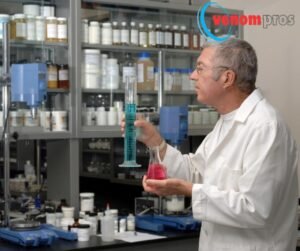
Masters of Poison: Unveiling the Secrets of Toxicologists
Toxicology is the study of poisons, but toxicologists are far from the stereotypical “mad scientists” concocting lethal potions in dark, hidden labs. They are skilled professionals who navigate the fine line between medicine and poison, understanding how substances interact with biological systems, and ensuring that the products we use and the environments we live in are safe.

The Art and Science of Toxicology
Toxicologists are experts in analyzing the effects of chemicals on living organisms. Whether it’s understanding the lethal dose of a substance, assessing the risks of exposure to industrial chemicals, or developing antidotes for poisons, their work is crucial to public health. Toxicologists use a combination of biology, chemistry, and medicine to study the mechanisms by which toxins affect the body and develop methods to counteract them.
The Historical Roots of Toxicology
The roots of toxicology stretch back to ancient times. The first toxicologists were healers and herbalists who recognized that certain plants could be both medicines and poisons, depending on the dose. Figures like Paracelsus, a Renaissance physician, famously stated, “The dose makes the poison,” encapsulating the idea that any substance can be harmful in large enough quantities Masters of Poison

Modern Applications of Toxicology
Today, toxicologists work in a variety of fields:
Pharmaceuticals: Ensuring that new drugs are safe for human use.
Environmental Science: Studying the impact of pollutants on ecosystems and human health.
Forensic Science: Identifying toxins in legal cases, such as poisonings or drug overdoses.
Regulatory Agencies: Setting safety standards for chemicals in consumer products, food, and water.
Challenges and Ethical Considerations
For example, a chemical might be useful in agriculture but harmful to nearby wildlife. Toxicologists must weigh these factors to make informed recommendations. Additionally, ethical considerations arise in testing procedures, particularly concerning the use of animals in experiments.

The Future of Toxicology
As our world becomes more complex, the role of toxicologists will only grow in importance. New challenges, such as the rise of synthetic chemicals, nanomaterials, and global pollution, require innovative approaches. Toxicologists will continue to be at the forefront of safeguarding human health and the environment, uncovering the secrets of poisons, and turning potential dangers into knowledge that can save lives.
In the realm of science, toxicologists are the true “masters of poison,” dedicated to unraveling the mysteries of toxins and ensuring our safety in an increasingly chemical world Masters of Poison.
The Toxicologist’s Toolkit: Techniques and Technologies
The modern toxicologist employs a vast array of techniques and technologies to explore and mitigate the effects of toxic substances. These tools allow them to examine toxins at every level—from their chemical composition to their impact on entire ecosystemsMasters of Poison.

Analytical Chemistry
. Techniques such as mass spectrometry, chromatography, and nuclear magnetic resonance (NMR) spectroscopy enable toxicologists to identify and quantify toxic substances in complex mixtures. These methods are essential for detecting trace amounts of chemicals in biological samples, such as blood, urine, or tissue, and in environmental samples, such as water or soil.
Toxicogenomics
Toxicogenomics combines toxicology with genomics to study how genetic variations influence an individual’s response to toxins. By examining how genes are expressed in response to exposure to a toxic substance, toxicologists can better understand mechanisms of toxicity, predict adverse effects, and identify potential biomarkers for exposure. This field is especially important in personalized medicine, where genetic information can guide safer drug therapies.
In Vitro and In Vivo Studies
While these studies are still used, there is a growing emphasis on in vitro (cell-based) methods. These alternatives reduce the need for animal testing and can provide insights into cellular mechanisms of toxicity. Advances in tissue engineering and organ-on-a-chip technologies also allow for more accurate modeling of human physiology in a lab setting Masters of Poison.
Computational Toxicology
With the rise of big data, computational toxicology has become an increasingly important field. By using computer models and simulations, toxicologists can predict the potential toxicity of new chemicals before they are synthesized. These models are built using vast databases of known chemical properties and toxicological data, allowing for the identification of hazardous substances without the need for extensive testing. This approach is crucial for screening large numbers of compounds quickly and efficiently Masters of Poison.
Epidemiology and Exposure Assessment
Toxicologists also play a key role in public health by conducting epidemiological studies to investigate the effects of exposure to toxins on populations. By studying the distribution and determinants of diseases caused by toxic substances, they can identify trends and risk factors.
The Global Impact of Toxicology
The work of toxicologists extends far beyond the lab, influencing global health, policy, and environmental protectionMasters of Poison.
Public Health and Safety
For example, they help establish acceptable exposure limits for chemicals in workplaces, consumer products, and food. In the pharmaceutical industry, toxicologists ensure that new drugs undergo rigorous safety testing before they reach the market Masters of Poison.
Environmental ProtectMasters of Poisonion
Environmental toxicologists study the impact of pollutants on ecosystems, assessing how chemicals affect wildlife, water quality, and soil health. They play a crucial role in environmental conservation efforts, helping to clean up contaminated sites and prevent further pollution. Their work is essential for protecting biodiversity and ensuring sustainable developmentMasters of Poison.
Global Challenges
In a world facing global challenges such as climate change, pollution, and the spread of harmful chemicals, the role of toxicologists is more important than ever. They are at the forefront of addressing issues like endocrine disruptors, persistent organic pollutants (POPs), and the effects of climate change on the distribution and toxicity of environmental contaminants Masters of Poison.
Also read this;>Rapid Response: The Critical Role of Emergency Medicine Specialists
Also read this;>Champions of the Pitch: The Ultimate Soccer Showdown







